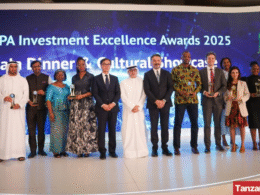TanzaniaInvest conducted an exclusive interview with Mr. Emmanuel Ole Naiko, the former Executive Director of the Tanzania Investment Centre (TIC), in order to learn about the current investment framework in Tanzania and discuss the available opportunities.
TI: How would you assess the TIC’s ten years of activity and its success in bringing foreign direct investment to Tanzania?
EON: It is very encouraging; it is more than what I had expected.
In the past, Tanzania was a socialist country; the private sector wasn’t allowed to participate in the economy prior to 1990.
But when we moved into a market-oriented economy, the TIC was established in 1990 to ensure that we revive the private sector, which was basically closed down in 1967.
When we started, we met a lot of resistance because of various legislations that conflicted with the spirit of inviting the private sector to do business.
In 1995, the government decided it was time to review the first investment code that allowed the private sector into business but on segmented areas.
As a result, we came up with a completely new investment policy in 1996, which opened up doors in areas that were only open to investors.
After serious debates throughout the country, we were able to establish a new investment code in 1997, which became the foundation of the TIC.
The objective was to build a private sector that was vibrant and strong, which would become the engine of economic growth.
Initially, we couldn’t see that working very much, but in September 2007 alone, for example, we saw a number of companies coming to Tanzania.
Over time, investors saw the opportunities that we had and they also saw the enabling environment.
We worked together with the private sector to ensure that all the impediments and barriers to the revival of the private sector were removed.
One pleasure that I have is seeing thousands of private sector companies working in Tanzania, in mining, in manufacturing, in tourism.
In all these sectors, the private sector is running the economy.
What needs to be done now is to ensure that the Tanzanian economy grows through the market-oriented policy that we have adopted.
Tanzania Investment Framework
TI: The TIC was named Best Investment Promotion Agency this year by the World Bank. To what factors would you attribute the high performance ranking that the TIC received?
EON: First, I would say it is political will; we have a government that is very committed to reforms and having such political will is one factor that has enabled us to deal with impediments.
The current president, His Excellency Jakaya Kikwete, has been chairing roundtable meetings, which have helped resolve impediments and foster mentality changes.
The second factor is the quality of the manpower we have at the TIC.
The people have been carefully chosen from the market so they can promote, facilitate, and take care of the investors that have been investing in this country.
So we have a capable manpower, we have political will, we have enabling legislations, and we are working towards reforms of those legislations.
Investors see what we are doing and are happy of the kind of treatment they receive, and I can assure you, we will continue in this spirit.
TI: Are there some things that still need to be changed in the legal framework in order for investors to be able to take full advantage of the investment opportunities that Tanzania presents?
EON: Yes.
Although we have commercial codes, there are some commercial cases that are piling up.
We still have old labor laws that nurture people who are not willing to work harder.
We are working on changing that.
Then, there is the land issue for which we want to establish a credible land bank.
We have started this process but we need to refine it further so that if investors come today, they know where to get the land.
We are currently working with the Investment Climate Facility for Africa (ICF) to start a pilot project whereby we will identify lands and survey them, so that investors know exactly where to go.
There is also the issue of lease financing; we still have problems with the accessibility of credit facilities.
We are working very closely with the banks to see how we can bring the interest rates down to encourage people to borrow locally.
So we are looking forward to the second generation financial reforms.
Tanzania Investment Opportunities and Outlook
TI: Tanzania has been growing for these last few years at an average rate of about 6%. However, in spite of this, the economy still remains very much linked to weather conditions because of the importance of the agriculture sector and also because of its obsolete production methods. What are your near-term forecasts both for the Tanzania agriculture sector as a whole and for the Tanzania investment opportunities in this important sector?
EON: Agriculture is one of the backbones of the economy of this country.
What we want to do now is to revive commercial agriculture.
This has been working for sugar plantations and it is also working for tea and coffee plantations.
What we want to do now is to grow food crops and cash crops that we can export.
We want to make sure that when investors want land for agriculture, they are able to get that land.
We want to motivate investors to take advantage of the opportunities in irrigation.
We want to encourage investors to add value to our agricultural products so that we can properly take advantage of the Africa Growth Opportunity Act (AGOA) and of the Everything But Arms (EBA) trade agreements to increase exports.
We also want to motivate investors to come here and develop human resources because Africa, right now, is very severely constrained with skilled labor.
We need investors that can establish technical schools like engineering schools with specific skills, ICT, accounting and so on.
TI: What do you think are the key issues that need to be tackled to ensure value enhancement for Tanzanian agricultural products?
EON: We need to develop large-scale commercial farms because we cannot depend on seasons for production.
Those large commercial farms will then be able to supply the sustainable quantities that are required by agro-processing factories in Tanzania.
TI: You mentioned agri-business, infrastructure, and higher education. What are the other sectors for which you are looking to attract FDI and which may also be attractive to foreign investors who are interested in examining Tanzania investment opportunities?
EON: I would like to also add the sector of tourism.
We are currently constrained with our hotels.
We have beautiful beaches, large national parks, conservation areas like Ngorongoro, growing cities like Mwanza, Arusha and Dar el Salaam, and all these have accommodation constraints.
We are desperately looking for investors in the hotel business.
We also want to diversify our tourism products.
At the moment, we are very much dependent on tourism for safari in our national parks, but there is more than that.
We also have 800 kilometers of coastline, with attractive beaches that are totally undeveloped.
We are also trying to encourage investors to start medical tourism by having good high-standard hospitals here.
And then we want to start sports tourism, like golf.
So there is still plenty of room for investment in tourism.
TI: Tanzania investment opportunities are clearly varied and plentiful. At the same time, Tanzania is also competing for FDI with other countries, some of which are in the immediate vicinity and others are located in other parts of the world. What are the main incentives for foreign investors who are searching for investment opportunities in Tanzania?
EON: Firstly, any capital coming to Tanzania is not taxed.
Secondly, when investors start making profit, they will not pay income tax until they have fully recovered their investment.
Thirdly, we have our one-stop shops where investors don’t have to knock on 10 doors.
Investors can just come to the Tanzania Investment Centre and avail themselves to the investor services here.
TI: Some say that Tanzanians’ mentality is still anchored to its socialist past. What do you think of this comment?
EON: I totally agree with that, but we are forgetting that even countries like Egypt and Indonesia went through this experience just like us.
When a country is changing, there will still be people with the old mentality.
We still have people who think that by being difficult to the private sector, they are helping the government.
What we need to do is to have proper supervision, proper regulations and [also] promote the rule of law.
To this extent, we have done quite a lot of work in involving the donors to work on a program called Business Environment Strengthening in Tanzania or BEST.
One of the functions of BEST is to make sure that we look at the legislation and harmonize laws that are conflicting, remove those that are redundant, and put one where the law is silent.{xtypo_quote}One of the functions of BEST is to make sure that we look at the legislation and harmonize laws that are conflicting, remove those that are redundant, and put one where the law is silent.{/xtypo_quote}
TI: Tanzania is a country that is struggling to put itself on the map and become known abroad. What would you like our readers to understand about Tanzania?
EON: In 2005, the University of Boston came up with a research conducted from 1994 to 2004, showing that there were only 2,706 major headlines in the American news media for the last 10 years for the whole of Africa.
At least 94 of these were on Tanzania.
The subjects were HIV/AIDS, problems in Zimbabwe, problems in Sierra Leone, and, generally, nothing good.
What they said, in the end, was that Africa should tell its own story and that is the only way in which the outside world can hear about Africa.
For the last 10 years, presidents, ministers and the TIC have gone around the world marketing Tanzania, and we will continue to do so.










